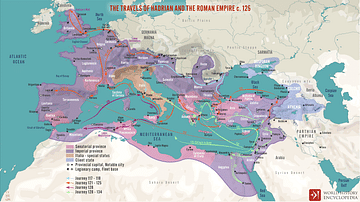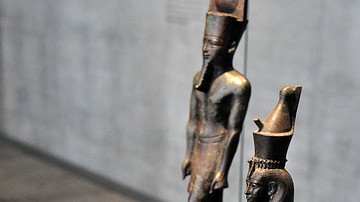Review

| Rating: | |
|---|---|
| Title: | |
| Author: | Anonymous |
| Published: | 1970 |
The Love God, the novel by Martin Campbell, tells the story of Antinous, the Greek man who conquered Hadrian, the great Roman emperor. The novel begins in Claudiopolis with the birth of Antinous and a serious accident that would leave a deep mark on his life. The author guides the reader through Antinous' childhood, his family and his relationship with Jason, his closest friend, until the day he met Hadrian, the Roman emperor, in a visit he makes to the Greek region of Bithynia. During his visit, Hadrian notices Antinous and develops an attraction which will determine the rest of their lives. Although Antinous does not know it yet, this day will become one the most important moments of his life since all his future will change from that day. Antinous will have to leave his family, home and friends to go to Rome, to a school for those who will belong to the Roman court in the future. There he will discover a new world with its own rules and cruelty. The Roman court life will be full of enemies who do not like his special relationship with the Emperor, but he will also meet the great philosophers and historians of that time. However, despite the enemies and difficulties that Antinous encounters during his life, this is a story about love, beauty and the discovery of a new world.
The novel is set between 111 CE and 138 CE in the last years of Trajan's reign and, mostly, in the period Hadrian was the Roman Emperor, from 117 CE to 138 CE. Hadrian was the heir Emperor of Trajan and was married to Vibia Sabina (niece of Trajan). His reign was a time without remarkable territorial expansion, but a cultural growth due to Hadrian's own interest on literature and philosophy, which led to a greater influence of philosophers and historians in the Roman court. Although the novel contains historical references, we cannot say it is a history book, however, it is a perfect way to know the life in Rome, its costumes, the political system and the court intrigues and influences.
Although most readers of The Love God would have an interest or knowledge of Roman history and culture, the author included a vocabulary section at the end of the novel, so the reader does not need to be an expert on Roman and Greek ancient culture to understand the text and the cultural references. Also, this section could lead to further research if a reader finds an unknown term and wants to know more about it.
Martin Campbell's writing style is clear and straightforward, but that does not mean his style is somehow poor. On the contrary, his writing contains a rich vocabulary and rhythm, so the reader cannot avoid reading chapter after chapter without even noticing the time passing. It should be mentioned as well that this novel is written from the point of view of an omniscient narrator, but not any narrator: Cupid himself. After an introduction by the love god at the beginning of the novel, Cupid appears at the end of each chapter to remind the reader that all the events of the story happen because of him. Nevertheless, that is not his only duty, Cupid also brings a touch or reality, a reminder of the true nature of this world and its people.
Finally, Martin Campbell's novel is an important book, not only because of its content, but because it is homage to all homosexuals. Therefore, this novel is the author's way of defending sexual freedom and show his support to the homosexual community and its current situation in the society. The novel is also a great opportunity for the reader to compare the status and situation of homosexuals in ancient Rome with the situation nowadays.
Cite This Work
APA Style
Alonso, L. P. (2016, March 22). The Love God. World History Encyclopedia. Retrieved from https://www.worldhistory.org/review/117/the-love-god/
Chicago Style
Alonso, Lidia Pelayo. "The Love God." World History Encyclopedia. Last modified March 22, 2016. https://www.worldhistory.org/review/117/the-love-god/.
MLA Style
Alonso, Lidia Pelayo. "The Love God." World History Encyclopedia. World History Encyclopedia, 22 Mar 2016, https://www.worldhistory.org/review/117/the-love-god/. Web. 16 Apr 2025.


